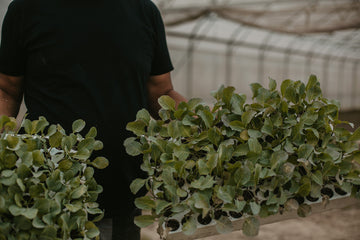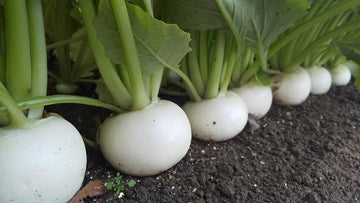Since Dick's grandfather, Bill Maggini, purchased the 60-acre property in 1928, the Swanks have added 210 acres to the farm, including 47 acres of CCOF-certified organic production. With expansion, came financial pressure and Dick and Bonnie reacted by creatively diversifying their operation. From their famous corn maze and Fall Festival, to farm-to-table events and a dream-like rustic wedding venue, the Swanks have successfully managed to supplement their farming income with creative and sustainable family-friendly activities and events.
Please tell us who you are and a little bit about your farming operation?
We're extremely diversified. Like most farmers, we sell our products wholesale, but we also sell at farmer's markets, host our own farmers markets and do on-farm events. We put on an annual Fall Festival and just last year we started a Sunflower Festival. We recently added a pretty big barn to our repertoire of stuff, and we're going to start doing weddings and private parties, along with our farm Fall Festival we're trying to generate more money year round.
How did you decide to get into the Ag and Farming industry?
Luckily I was kind of born into it. My dad was a dairyman and my grandfather on my mom's side bought our home ranch in 1928. My grandmother had to kick her tenant out because he hadn't paid her rent for two years, so she gave the ranch to my mom and my aunt and invited us down to the farm. I feel so blessed that my grandfather bought such a good piece of ground.
What were some of the first crops that you grew back in the day?
We grew the first crop you could grow - alfalfa.
I was lucky enough to wake up one day in the late 80's when my kids were still small, and thought, “This is a horrible life.” I loved dairy farming, but we weren't making any money. So, we sold our cows in a buyout, and then I made the second biggest mistake in my life - trying to learn how to farm on the run. We'd never grown vegetables, just grew hay and hay and corn. There was a bit of a learning curve there. The whole curve was just trying to make money being a small farmer - that's the hardest part. It's almost impossible.
In 2000, I met my wife and we started a corn maze, which was what started to turn the ship around. My wife figured we could invest the extra money we made back into farming, which turned out to be very helpful. We realized that we really need to be diverse. When we moved properties, we built a barn and said ‘let's do weddings' ‘let's do this', ‘let's do that'. We really had no idea for four years. It took a little over four years to get this thing done. At one point, we had a middle building design, kitchen, bathrooms, and everything and then my neighbor showed me these wooden barns and I showed it to Bonnie and we started all over again. I think we took like $15,000 and just flushed down the toilet.
Particularly on the Ag side of things, do you mind sharing a few things that you love about this industry?
Growing really good food is what we like to do. Because we don't mass produce anything, we lean towards growing things that we like to eat, and we grow within the season. We grow English peas in the springtime and early summer, right now we're picking broccoli and cauliflower, carrots, beets, and lettuce. We only have a few hoop tunnels today, but we're going to have to put in more hoop tunnels because it really changes the height which really extends the season. We also have a partnership down in Carpinteria for tomatoes and cucumber so we can so we can grow tomatoes year-round.
We are particularly excited about these new Oishii Nippon Project vegetables, learning how to grow them and educating our visitors about new varieties like yours.
How many acres are you overseeing these days? And what are the main crops you're focused on?
It's just slightly over 100 acres - 105 acres. We try to get two crops a year off of everything.
Just in the tomatoes we grow, at least 25 different varieties of tomatoes. That's just on the tomato and tomatoes is our biggest crop, we'll do 12 acres of heirloom tomatoes. That's probably how many pumpkins but that's a whole other topic.
We like the challenge of farming. It's not boring, you're learning something every week if not every day, every year. We'll stop learning when we're gone. That's the worst part, like my grandfather. My grandfather had two daughters and he was hoping a grandson would come along, and thank goodness things have changed. I just hope a granddaughter or grandson comes along that wants to run things because Bonnie and my goal was to keep it going in the family.
What would you say are you already most proud of with what you guys have accomplished so far?
I think the diversity of our operation. Being able to do so many things and to be able to actually do them fairly well. I think it's really the only way a small farming operation can make it.
Beyond farming, we do things that people drive from out of town come to our farm for. That's probably what we're most proud of. And the tomatoes!
For more information on Swank Farms' produce and agrotourism, visit swankfarms.com.




